Australian Prime Ministers
Source: Convictcreations:
http://www.convictcreations.com/history/primemine.htm
“Let no-one say the past is dead, the past is all about us and within”(Oodgeroo)
Australia’s prime ministers have been quite an eclectic bunch. They have suffered from an assortment of physical deformities, uttered some “colourful” phrases and, on the sly, shown that they have somewhat of liking for debauched behaviour.
Traditionally, the Australian media has refrained from reporting on a prime minister’s private life. The general etiquette has been that if he or she has passed good policy then their private life should be irrelevant. It is debateable as to whether this should be the case. Many voters don’t allocate their vote on the basis of a proposed policy; they allocate their vote on the basis of their values and how well the perceived values of the leader of the major parties reflects their values. For this reason, it is worth knowing what values a prime minister has lived by in his or her personal lives, as well as the policies he or she implemented to regulate the affairs of Australian society.
Scott Morrison (Liberal Party of Australia ) 24th of August 2018 to present
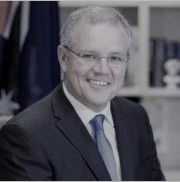
- Early in life, he had a career as a child actor in commericials.
- Was raised in the Uniting Church but later became Pentacontal
- Said, “the Bible is not a policy handbook, and I get very worried when people try to treat it like one.”
- Started dating his future wife at 16 before marrying her at 21.
- Completed a degree in Economy Geography
- Prior to entering parliament, he was a managing director of Tourism Australia, where he approved the “Where the Bloody Hell Are You campaign.”
- Initially lost preselecton until allegations of branch stacking resulted in his opponent being disendorsed. The allegations were later found to be false.
- In his maiden speech after entering parliament, he said, “Australia is not a secular country — it is a free country. This is a nation where you have the freedom to follow any belief system you choose. Secularism is just one.”
- Made his name by stopping the arrival of refugee boats. His office reported that in 2013, there were 300 boats and 20,587 arrivals. After he launched Operation Soveign Borders in 2014, his office reported that there was only 1 boat and 157 arrivals for the year.
- As a teenager, he studied at Sydney Boys’ High School. In March 2015, approximately 300 alumni signed a letter protesting Mr Morrison’s attendance at a fund-raising event because he had “so flagrantly disregarded human rights”.
- Was an opponent of legalising same sex marriage and abstained from voting on the final bill.
- Emerged as a compromise candidate after a disgruntled right faction of the Liberal Party became intent on removing Malcolm Turnbull from the party leadership.
MAIN POLITICAL TRICK – I am bloody well like you
After becoming prime minister, went bush and strangely wore a baseball cap instead of an Akubra as is the standard hat for politicians visiting the land. In addition, dubbed himself ScoMo, made himself visible at local rugby games, went for a spin at Mount Panorama and slipped “fair dinkum” into his answers. ScoMo is intent on being “ordinary.”
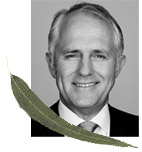 Malcolm Turnbull (Liberal Party of Australia ) 14th September 2015 to 24th of August 2018
Malcolm Turnbull (Liberal Party of Australia ) 14th September 2015 to 24th of August 2018
- Father was a hotel broker. Mother was a radio actor, a writer and an academic.
- Parents separated when he was 9. His mother moved to New Zealand with the family’s cat to marry another man, leaving Malcolm to be raised by his father.
- His father gave him the middle name of Bligh in honour of Governor William Bligh who was deposed in the Rum Rebelllion.
- Prior to entering parliament, he worked as a journalist, a lawyer, a merchant banker and a venture capitalist.
- Australia’s richest man, Kerry Packer, said he would not like to come between the young Malcolm and a sack of gold.
- With a net worth of around $200 million, he was the richest prime minister in Australian history.
- Wore a leather jacket to look “relatable”
- While defending the publication of a book against British government attempts to suppress it, he said,
“The public interest in free speech is not just in truthful speech, in correct speech, in fair speech… The interest is in the debate. You see, every person who has ultimately changed the course of history has started off being unpopular.” - In 1993 he was appointed by then Labor Prime Minister Paul Keating to be Chairman of the Republic Advisory Committee.
- Led the Australian Republican Movement to defeat at the referendum, despite polls showing public support for a republic to be around 90%.
- After the referendum, he approached at least 6 senior Labor Party figures to seek endorsement to join the party. In particular, he wanted to be the finance spokesman. Was rebuffed by the then Labor leader, Kim Beazely, who said he was a Lib. He later joined the Liberal Party.
- While campaigning, he invited an Iman to come to publicised dinner who had previously called for women to be executed for pre-marital sex, adulterers to be stoned to death and that homosexuality is an evil act that brings evil outcomes to society. Later declared he would not have extended the invitation if he had known the man’s beliefs.
- Initiated a same sex marriage plebiscite, which was carried by the public.
- Made a deal with US president Barack Obama to swap refugees. Australia would take 1,250 refugees from Central America in exchange for the U.S. accepting refugees on Nauru and Manus island.
- Said that we “need advocacy not slogans.” Later came up with the slogan “continuity and change.”
- Challenged for the Liberal Party leadership on the basis that his predecessor had lost 30 consecutive newspolls.
- Turnbull subsequently lost 38 before losing the leadership.
MAIN POLITICAL TRICK – Do nothing
Australia has two voting innovations that stifle extremism and encourage political parties to aim for the “middle-ground”. Firstly, preferential voting ensures that it is the least hated (rather than most liked) that win seats. Secondly, compulsory voting forces the apathetic voters (who are not rusted on to a party or care much about the electoral process) to cast votes. These are the swing voters that decide elections.
Turnbull’s aim for the middle-ground basically involved not fighting for anything at all. His slogan of “Continuity and Change” was previously used by American sitcom Veep as the writers said it embodied “the most meaningless election slogan we could think of.”
VERDICT
Turnbull had a stated position in favour of an Australian republic and carbon trading. In return for his party making him PM, he agreed not to assert his favoured positions. This indicated that he didn’t really believe in what he had promoted, that he would sacrifice his beliefs for personal gain or that he didn’t have the persuasion skills to change his party’s viewpoints and actually lead. Each of the three possibilities demonstrated a character flaw of someone who was not fit to be PM.
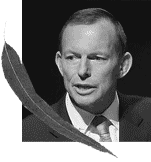 Tony Abbott (Liberal Party of Australia ) 18th September 2013 to 14th September 2015
Tony Abbott (Liberal Party of Australia ) 18th September 2013 to 14th September 2015
- Born England to an Australian mother and an English-born father.
- Migrated to Australia at the age of 3.
- A student boxer who earned two blues while boxing for Oxford.
- Organized protests in favour of the Falklands War.
- During his student days, he once saved a child who was swept out to sea. Another time, he helped save children from a burning house next to a pub where he was drinking.
- When he was 19, his girlfriend became pregnant and claimed Abbott to be the biological father. The couple did not marry and put the child up for adoption. For 27 years, Abbott believed that he fathered a boy. When the boy grew up, he sought out his biological parents and believed Abbott was his father. After the story was reported around the world, a former secret lover of Abbott’s former girlfriend thought the boy looked like his own son. DNA testing later revealed that Abbott was not the father.
- A student newspaper editor took him to court for indecent assault after he touched her during a student debate. The charges against him were dismissed in court.
- Aged 26, he studied to become a catholic priest. He later quit because he felt that he was a square peg in a round hole.
- As a Parliamentary Secretary, he oversaw the establishment of the Green Corps program which involved young people in environmental restoration work.
- Challenged for the leadership of the Liberal Party on a platform of opposing a carbon trading scheme.
- As prime minister, gave a knighthood to Prince Phillip (The Queen’s husband.)
- While opposition leader, was called a misogynist by then Prime Minister Julia Gillard. After becoming prime minister, said the criticisms of his chief of staff (a woman) were motivated by sexism.
- Said he was going to “shirt front” Vladimir Putin.
- Sparked a media frenzy after eating a raw unpealed onion while touring a farm.
- As Prime Minister, Abbott oversaw free trade agreements signed with Japan, South Korea and China.
- Used a variety of policies to stop people claiming asylum in Australia if they arrived by boat.
- Set out on a 9-day charity bike ride between Melbourne and Sydney generating political debate about whether a prime minister should commit so much time to exercise.
- Caricatured as a mad monk due to his name and past studies in the priesthood.
- Journalist Nikki Savva gained a great deal of press with a book that talked of perceptions that his trust in his female staff was the result of an extra-marital affair between the two.
- Human rights lawyer Julian Burnside referred to him as “peados in speedos”, presumably in reference to his Catholic faith and choice of swimwear.
- The shortest-serving prime minister since William McMahon.
MAIN POLITICAL TRICK – Let’go boxing
Abbott was like a boxer who had the strategy to defeat an opponent but not win over the crowd. In other words, he had skills to be a great politician but not a great statesmen. Draping himself in the British flag while boxing for Australia was always a risky strategy as was asserting a Catholic faith in a secular society. If he had stated that his support for the British flag was a nod to internationalism, perhaps critics would not have caricatured his Monarchist views as a reflection of him being stuck in the past. Likewise, if he had been like Paul Keating and portrayed his Catholic faith as a kind of representation of being a fighting Irish underdog, then his critics might not have caricatured him as the Mad Monk or “Paedos in speedos”.
VERDICT
Moral dilemmas are always divisive because they involve a subjective evaluation of a diversity of issues that are not valued equally within a society. For example, if the UN set up a refugee processing camp on the edge of a minefield, would it be moral to only allow processing to those who come via the safe route that has been cleared of mines? Would it be moral to open a back door and offer expedited and guaranteed admission to those with the courage to risk the minefield knowing that some would live and some would die? Such questions can never achieve consensus.
Abbott was faced with a great deal of moral dilemmas during his time as leader. Irrespective of whether the moral dilemmas achieved the greatest good, it can’t really be disputed that he failed in communicating those choices to the Australian public. This ultimately made him very unpopular and cost him the leadership of his party and the country.
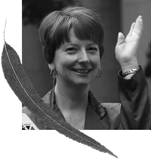 Julia Gillard (Labor Party of Australia ) 24th June 2010 to 27 June 2013
Julia Gillard (Labor Party of Australia ) 24th June 2010 to 27 June 2013
- Born in Wales. As a baby she contracted a severe lung infection and spent weeks in a oxygen tent in hospital, prompting her parents to migrate to the warmer climate of Australia.
- Former secretary of Socialist Forum.
- Lobbied for the scrapping of the ANZUS treaty.
- Had a two-year relationship with fellow Minister Craig Emerson, who was married with three children at the time.
- While working as a lawyer, had an affair with one of her clients (an allegedly corrupt union official), and set up bank accounts that helped him laundry money, some of which may have been spent on the renovations of her house. When exposed, her firm accepted her resignation and she spent 6 months unemployed.
- A royal commision into corruption responded to her demands to be trusted due to her “good character” by finding, “A further problem raised by the submission is that though there is virtually no evidence of Julia Gillard’s good reputation and character beyond that which is to be inferred from her status as a former prime minister”.
- Her office created a plan to set a mob of angry Indigenous protestors on the leader of the opposition backfired when the mob turned on her, forcing her to be evacuated under armed guard. Later defended herself by saying the plan was devised her media advisor Tony Hodges and she had not been aware of it.
- First female prime minister.
- A proud athiest.
- Only unmarried prime minister.
- Attacked the Greens for not having family values.
- Opposed paid parental leave.
- Said she didn’t believe in gay marriage and that mariage should be between a man and a woman.
- Said women “do not think the same way as men”.
- Said that women in marriage are like prostitutes.
- Stood behind MP Craig Thomson who had been found to have misused up to $500,000 of union funds on expenses such as prostitutes
- Gave her boyfriend, a hairdresser, a job as health ambassador
- Said, ” I’m just going to be upfront about this: foreign policy is not my passion”
- In May 2010, said, “There’s more chance of me becoming the full-forward for the Dogs (Western Bulldogs AFL team) than there is any chance of a change in the Labor party.”
- In June 2010, challenged for the leadership of the Labor Party and won
- Vowed not to introduce a carbon tax before her maiden election. After forming a coalition with the Greens MP, introduced a carbon tax
- After leading the Labor Party in a disastrous election, claimed her predecessor had sabotaged it
- After leading Labor to its lowest ever poll ratings, claimed her leadership was being sabotaged by her predecessor
- After her predecessor went to the back bench and remained silent on all issues, blamed the media for sabotaging her government
- When she found out that Peter Slipper, a member of the Liberal Party, would lose pre-selection because of alleged dubious conduct, she offered him a deal to become speaker of the house and so gain an extra vote. Slipper subsequently had sexual harassment and fraud allegations levelled against him and had to stand aside
- Made a deal with an independent to crack down on problem gambling using poker machines. Reneged on deal when she was able to manipulate numbers to eliminate the need for the independent
- Said if she had been Aboriginal, rather than a woman, there would have been more outrage at the discrimination she believed she suffered.
- When she discovered that her speaker referred to a jar of muscles as a jar of delicious “salty cunts”, she stood by him and launched into a speech accusing her critics of misogyny.
- Polls showed that she was the most unpopular prime minister in history.
- After polls showed that she was leading Labor to oblivion, her party replaced her with Kevin Rudd, the predecessor that most of the party couldn’t stand.
MAIN POLITICAL TRICK – Society is to blame
As her popularity went into freefall as one policy disaster followed another, perhaps Gillard saw the gender card as an excuse to have a legacy other than the most unpopular prime minister in Australian history. It seemed to protect her ego but it had as much success as her office’s plan to set an angry mob of Indigenous people onto her political enemy.
VERDICT
If Gillard were Game of Thrones character, she would be Cersei such was the failed leadership, the lack of private morality and the tendency for her manipulations to backfire.
Gillard blamed her failure on sexism of the Australian public. Perhaps a more objective reading would be that she was so desperate to hold onto power that she sold her soul to an opposition party and independents in a way that made it impossible to portray herself as honourable, honest and capable of solving the difficult problems. At the very least, history will not assert her as a leader of great morality. As the royal commision into union corruption found, aside from her status as a former prime minister, there was nothing in her history to suggest she was of good character.
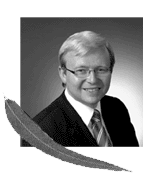 Keven Rudd (Labor Party of Australia ) December 3 2007 – 24th June 2010 and 27 June 2013 – 18 September 2013
Keven Rudd (Labor Party of Australia ) December 3 2007 – 24th June 2010 and 27 June 2013 – 18 September 2013
- Had an operation at the age of three to correct his badly bowed legs
- Some time between the ages of five and seven, he was struck down by rheumatic fever and found himself once again in hospital and recuperating at home for long stretches.
- Grew up on a dairy farm in rural Queensland
- Father died when he was 11 and his family was evicted from the farm
- Joined the ALP when he was 15
- After high school, hitch-hiked down the east coast and eventually reached Canberra
- Always wore RM Williams Boots – even to parliament
- Majored in Chinese and became the first western leader to speak fluent putonghua
- Spent most of his early career working in Australian embrassies in foreign countries
- As shadow foreign minister, reformulated Labor’s foreign policy in terms of the “Three Pillars”: engagement with the UN, engagement with Asia, and the US alliance
- While opposition foreign affairs spokesman, went to New York, got drunk and visited a strip club
- Committed Christian that often gave press conferences from the Church steps
- Had Convict ancestry on both sides of his family. Told a European audience that this made him an “An absolute pedigree.”
- Said: “by way of personal instinct, I have an inherent distaste for grandiose rhetorical statements, which don’t have any substantive dimension to them”
- Gave a $35 million grant to Toyoto to develop a hybrid car, even though Toyota said it didn’t need the money as it was developing the vehicle anyway
- On behalf of the federal government, apologised for state and federal governments removing mixed-race children from Aboriginal communities from 1901 to the 1970 but didn’t have any ministers for Aboriginal affairs prosecuted for genocide – as the practice had been defined by a government report
- Took a populist position on a carbon-trading scheme. Fuelled the populist position with tax-payer funded advertising intended to “raise awareness” of global warming
- Said reducing carbon emissions was the “great moral challenge of our generation.” Later backed down on carbon trading when it lost popularity with the electorate
- After US president George Bush organised a G20 meeting, Rudd leaked to the media that he had persuaded Bush into expanding the G7 into the G20. At the subsequent meeting, Bush demonstrated that Rudd was not a person of importance to him
- When in opposition, said political advertising paid by the federal government was a “cancer on democracy”. When in government, used taxpayer funds on campaigns to raise awareness of the government concern about global warming and in its fight with the mining industry
- In response to collapses of American and European banks, went on a spending spree to ward off recession. In the process, he took a $20 billion surplus and turned it into a $57 billion deficit; a $77 Billion turnaround. He also took the $60 billion ‘Futures Fund’ and turned it into a $100 billion debt: a $160 Billion turnaround. Meanwhile, Australia’s chief export countries of Japan, China and South Korea never went into recession. China used its surplus to buy depressed stocks
- Vowed to rid the world of nuclear weapons, build a new broadband network, integrate Asia into an European style union, stop global warming, regulate global currency trade, remove disadvantage in Aboriginal communities and stop whaling by the Japanese. Never said how the goals would be achieved, and never achieved any of them
- In little less than 6 months, went from Australia’s most popular prime minister in history, to a political liability. His party removed him from office without Rudd even contesting the spill.
- After losing the the leadership, became Foreign Minister, but Julia Gillard blamed him for destablishing her government. Challenged for the leadership, lost and went to the backbench, where he continued to be blamed for Gillard’s low popularity
- If Gillard supporters are to be believed, managed to out communicate the entire Labor Party in a way that eroded Gillard’s popularity and forced the party to draft him back into leadership
- Was filmed pulling ear-wax out of his ear and subsequently eating it
- Leaked American cables said of him:
”Rudd … undoubtedly believes that with his intellect, his six years as a diplomat in the 1980s and his five years as shadow foreign minister, he has the background and the ability to direct Australia’s foreign policy. His performance so far, however, demonstrates that he does not have the staff or the experience to do the job properly”
MAIN POLITICAL TRICK – In symbols we trust
With his public service background, Rudd was very much the symbols man. Writing policy documents destined to be put away in a draw and praising someone who “campaigns for…” without achieving it are noble behaviours in such fields. In his initial years in government, the political trick worked equally well. However, when the electorate demanded results, his popularity went into freefall. Threats, anger and intimidation then became the staples of his leadership.
VERDICT
Rudd was addicted to public appeal and personal gain but implemented policies that made the lives of Australians much worse. His response to the Global Financial Crisis was classic Rudd in that it served his short-term political needs and enabled him to rub shoulders with World Leaders; however, it pushed many Australians into financial hardship and shackled future generations with a mountain of debt.
Rudd would have been more suited to the UN where he could give speeches but didn’t have the power to destroy anything or the expectation to fix anything.
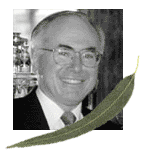 John Winston Howard (Liberal Party of Australia ) 11 March 1996 – December 3 2007
John Winston Howard (Liberal Party of Australia ) 11 March 1996 – December 3 2007
- Suffered from a hearing impairment in his youth which left him with a speech impediment
- Lived at home until he was 32 years old
- Attended a publicly funded state school
- In his younger years, wanted to restrict Asian immigration
- When he came to power, presided over the most open and diverse immigration intake in Australia’s history
- Whipped up hostility against asylum seekers by manufacturing evidence they had thrown their children off a ship to improve their chances of getting into Australia. In truth, the asylum seekers had deliberately sunk their boat and after throwing their children overboard, jumped in after them
- Facilitated the independence of East Timor
- Committed Australian troops to the invasion of Iraq based on incorrect claims the country had weapons of mass destruction
- Introduced a goods and services tax
- To make houses more affordable, introduced a $7K first home owner’s grant. Median prices for houses in Australian capital cities rose by an average of $32,000 over the next year, making houses less affordable.
- Although government interests don’t always coincide with what is best for the economy, he gave the Reserve Bank of Australia complete freedom to alter interest rates
- After the Port Arthur massacre, risked splitting his own coalition by introducing a forced guns buy back scheme that reduced the number of assault weapons in Australia
- After the 2004 Asian tsunami, gave $1 billion in aid to Australia’s Asian neighbours
- Refused to dismiss a governor-general who was engaged in the cover-up of paedophile activity
- Opposed Australia becoming a republic
- Refused to take part in 150-year anniversary celebrations of Australia’s Eureka rebellion.
- In Afghanistan, used a photo opportunity to turn his cricket arm over. Ended up bruising his big toe
- Rumoured to be having an affair with the mother of a famous Australian model. Although the rumour has proved to be very persistent, it was, by reliable accounts, not based in fact. Howard may well be one of the few Australian prime ministers to have had a conservative private life
- Was awarded the US Medal of Freedom
- 11½ years of record economic growth, the lowest unemployment in 33 years, low interest rates and inflation boxed in between 2% and 3%
- When he was ousted, he left behind a healthy banking sector, zero government debt, a budget surplus, the Future Fund, the Higher Education Endowment Fund, the Communications Fund. Combined, the funds provided a massive financial buffer of about $90 billion
- Refused to hand over power when it became obvious his time had passed. Then became only the second prime minister in history to lose his seat
- Second longest serving Australian prime minister
MAIN POLITICAL TRICK -Dividing and conquering
Howard’s main trick was to provoke criticism from the left so that the criticism could be used to expose the ideological divide between the Labor Party’s working class supporters and their university educated supporters. For example, he supported unions wanting to log in Tasmania so that outraged environmentalists would shout down his support. He took a working class position on asylum seekers in the hope that criticism from intellectuals would again expose divisions in the Labor Party. Although outrage from the left was used to his advantage, ultimately it led to Australia becoming a very polarised society. Criticism was common but productive discussion was rare.
VERDICT
After Keating, the prime minister that Australia had to have. Howard stimulated a stagnating economy that had been deep in debt, engaged with Asia, saw off the threat of Pauline Hanson’s One Nation, which originated under the rein of Keating, and presided over the largest and most diverse immigration intake in Australia’s history. Exploiting asylum seekers and invading Iraq were major blemishes.
By the end of his term, Howard was governing for his place in the record books instead of the good of Australia or even his own party. Due to his refusal to retire, Howard cost his party the 2007 election.
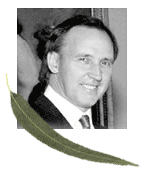 Paul John Keating (Australian Labor Party) 20 December 1991 – 11 March 1996
Paul John Keating (Australian Labor Party) 20 December 1991 – 11 March 1996
- Left school at age 15 with an Intermediate Certificate and then entered politics
- Bob Hawke, a Rhodes Scholar, said of him: “With little formal education, his intellect led him to hobbies, one after another, all his life: car engines; budgerigars; the life of Winston Churchill; rock music and, as his taste matured, classical music and its visible sister, architecture.”
- After prime minister Bob Hawke refused to hand over power, he resigned from the front bench and destablised the government from the backbench
- In 1993, won an election that was said to be “un-winable”. In 1996, lost an election said to be “un-loseable”
- Called the senate “unrepresentative swill”
- Let home-loan interest rates reach 17 %. Became known as Mr 17%
- Said Canadian Conrad Black could increase his ownership of Australian media if he gave Keating more “balanced” coverage. Asked to elaborate what “balanced” meant, Keating said, “I’m the prime minister.”
- After economic figures showed Australia was in recession, said: “This is the recession we had to have”
- Told a protester on his ill-fated 1996 election campaign to “get a job”
- Caused a diplomatic crisis by calling the Malaysian Prime Minister a ‘recalcitrant.’ Even when faced with trade sanctions over the comment, he refused to say “sorry”
- The Malaysian Prime Minister, Mahathir Mohamed, said of him: “We can’t do anything. If people have no manners, I mean children we can smack them [laughs] I think that a whole nation, or there generally is one nation who have no manners. It’s very difficult, who resort to personal vilification and all that”
- Said that Asian countries were the places you fly over on the way to Europe
- After Sheikh Al Hilaly’s immigration visa was rejected by security officials, Keating interferred and had it given for his own electoral benefit
- Disliked cricket and ended the tradition of the PM’s 11 vs touring teams. Also criticised Bob Hawke for being a “sports junkie”
- Destroyed the Australian film industry. Keating scrapped the system of tax concessions that had proved successful in the 80s and replaced it with funding for film distributors, sales agents, and broadcasters. The funding system allowed Keating’s party to have control over the type of movies being made, distributed, promoted and shown
- Said Sydney architecture was an “urban junkyard”
- Said on gay marriage, “Two poofs with moustaches and a spaniel do not make a family”
- Managed a band called the ‘Ramrods’
- Collected European cuckoo clocks
- Said he was the Placido Domingo of Australian politics
- Wore Ermenegildo Zegna suits
- Asked journalists to stop photographing him from behind where his bald patch could be seen
- Said Australia risked becoming a “banana republic”
- Kissed the ground of the Kokoda track. Some old diggers interpreted the gesture as a sign that Keating wanted his arse in the air
- Used phrases like: “Honourable Members opposite squeal like stuck pigs”
- Said of John Hewson, former leader of the coalition: “(His performance) is like being flogged with a warm lettuce leaf”
- Said: ” Australia is the arse end of the world”
- Biographer Blanche D’Alpuget noted that he was a great ladies man because he loved talking about shopping and clothes
- Repealed the ban on lesbians and gays serving in the armed forces
- Introduced “interdependency visas” allowing same sex partners of Australian citizens to migrate to Australia
- Was the first Australian Prime Minister to offer a message of support to the Sydney Gay & Lesbian Mardi Gras
- Said he was a Collingwood fan and that he hoped to see them “kick a try”
- Appointed gay activist judge Michael Kirby to the High Court. Kirby became known as the great dissenter, and disagreed with his fellow judges in almost every second case
- Said he was a practising Catholic
- After losing office, divorced his wife and pursued a happy lifestyle.
MAIN POLITICAL TRICK – The Big Bluff – Arguing a weakness is a strength
Keating had a remarkable ability to bluff people in that he managed to convince the true believers that all his failures were achievements. For example, after leading Australia to recession, unemployment, and 17 % interest rates, he fought an election on the slogan “jobs not GST.” After alienating himself from Asia by saying they were the countries that you fly over on the way to Europe and calling the Malaysian PM a “recalcitrant”, he argued that Asian leaders would never work with anyone except him. After appealing to voter self-interest in regards to fear of a new tax, he argued that he made Australians less selfish and more community minded. After trying to use Aborigines as a wedge to divide the coalition between the rural-backed Nationals and the city-backed Liberals, he said he was a uniter not a divider. After abandoning his party’s platform on Indigenous land ownership, portrayed himself as a great Indgenous champion by supporting a High Court judgment offering a vastly inferior deal.
VERDICT
Although Keating hated sport, he had a number of traits that would have gone down well in the crowd at a football game. He had a biting comic wit, an acid tongue, and a colourful command of language. With these traits, he had a great talent for tearing people down. While such traits are valued in football crowds, they are not suitable for a prime minister. As a consequence, Keating divided Australia, alienated Asia, and eventually alienated a majority of Australian voters.
When he was Bob Hawke’s treasurer, Keating did some good things in reforming the economy. As a leader, Keating was a travesty and the polarised society he created is yet to be reconciled. If only Keating had liked sport, he might have been able to reserve his adversarial tongue for the big game and then pursued consensus building in parliament, like Hawke.
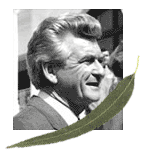 Robert James Lee Hawke, AC (Australian Labor Party) 11 March 1983 – 20 December 1991
Robert James Lee Hawke, AC (Australian Labor Party) 11 March 1983 – 20 December 1991
- A Rhodes scholar
- Said: ” Do you know why I have credibility? Because I don’t exude morality”
- A journalist recounted: “I interviewed him in 1984, when Britain was negotiating to sell some naval vessel or other to Australia , a deal which Hawke referred to ‘the Poms trying to rip us off again’. The interview was informal – Hawke was lying on the lounge in his hotel room wearing only a pair of shorts and eating iced cherries from a bowl perched on his chest”
- Former leader of the Australian Council of Trade Unions
- Changed Australia ‘s national anthem from “God save the Queen” to “Advance Australia Fair.”
- After Australia won the America ‘s Cup said: “any boss who sacks his staff for being late for work tomorrow must be a bum”
- Immortalised in the Guinness Book of Records for sculling 2.5 pints of beer in 11 seconds Said of his drinking achievement: ” This feat was to endear me to some of my fellow Australians more than anything else I ever achieved”
- During his first term in office, he gained the highest popularity rating of any Prime Minister since the introduction of public opinion polls
- Introduced Medicare on 1st February 1984
- Floated the Australian dollar
- Deregulated the Australian economy
- Reformed the Australian tax system
- After student protests in Beijing’s Tiananmen Square were put down with brutal force by the Chinese Government, broke down on television, announcing that all 20,000 Chinese students then resident in Australia could stay permanently
- Vowed that by 1990 no Australian child would be living in poverty
- In 1989 he admitted on television that he had been unfaithful to his wife Hazel
- Divorced his wife Hazel
- Had his glasses smashed after being hit in the face by a cricket ball at the Prime Minister’s XI versus parliamentary press gallery. Being hit in the face made him popular as it was seen as a sign that he would rather take a bouncer on than duck it
- Called him “old jelly-back” by Paul Keating because of his love of consensus
- Banned mining in Antarctica
- Supported uranium mining in Australia
- Publicaly revealed that his daughter was addicted to heroin
- Led the ALP to a record fourth term
- Lost the leadership to Paul Keating and thus became the first Labor leader not to be voted out of office by the Australian people
MAIN POLITICAL TRICK : Hawke was a positive prime minister who was more concerned with enjoying his sport than with finding faults with others. Unlike Keating, who relished adversial politics, Hawke was very much a consensus builder.
VERDICT
Hawke was a positive prime minister, more interested in building consensus than finding faults with others. Hawke presided over an era where Australia not only had great economic development, but also had great cultural enrichment. Musical acts like Midnight Oil, Icehouse, Men at Work, and Gangajang created anthems for Australia. Movies like Crocodile Dundee brought the world’s attention to Australia. Artists like Pro Hart, Brett Whitely and Jeffrey Smart provided new takes on the landscape and identity. Australia II won the America’s Cup and businesses like Fosters took on the world, and succeeded.
A great prime minister.
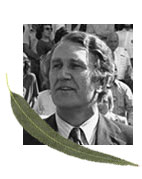 John Malcolm Fraser, PC, CH (Liberal Party of Australia ) 11 November 1975 – 11 March 1983
John Malcolm Fraser, PC, CH (Liberal Party of Australia ) 11 November 1975 – 11 March 1983
- While in opposition, blocked supply to Labor Party leading to dismissal of the Government
- Established the SBS
- Spoke with a British accent, and used British words
- In 1986, he was photographed walking into the lobby of the Admiral Benbow Inn in Memphis after forgetting to put on his trousers. Later claimed he had been drugged by a local prostitute
- Created the SBS with a charter to reflect Australia’s multicultural society. Because Australia already had the ABC with a charter to reflect the Australian identity, seemed to be saying that the ABC was for “Australians” while the SBS was for “ethnics.”
- Helped bring Mugabe to power in Zimbawee
- Recognised the Khmer Rouge in Camodia
- After Indonesia invaded East Timor and killed dissidents, Fraser recognised Indonesia’s sovereignty of the country
- Cried after being voted out of office
- Ironically, despite using his time in office to recognise oppressive regimes, spent his time after leaving office campaigning for the human rights of refugees.
VERDICT
Like Whitlam, Fraser tried to portray himself as the leader of compassion. Unfortunately for him, his role in the dismissal of the Whitlam Government ensures he will always be hated by people who identify themselves as holding a monopoly on human goodwill. Nor will Fraser ever be celebrated by the economic rationalists for, despite controlling both houses of parliament, he left the important economic reforms for the subsequent Labor Government of Bob Hawke. Due to his alienation from both sides of politics, losing his trousers in Memphis is the best Fraser can hope to be remembered for.
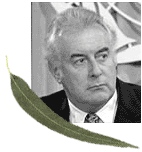 Edward Gough Whitlam , QC (Australian Labor Party) 5 December 1972 – 11 November 1975
Edward Gough Whitlam , QC (Australian Labor Party) 5 December 1972 – 11 November 1975
- Only Prime Minister to have been raised in Canberra
- Grandfather was a criminal that spent time in jail, father was a lawyer and Whitlam was a prime minister.
- Made higher education free
- In parliament, threw a glass of water over a Liberal minister
- Described his philosophical position as “post-Christian”
- Ended conscription
- Reformed Health, Equal Opportunity and established the Family Court
- Recognised communist China
- After the Immigration Restriction Act had been dismantled by th previous Liberal and Labor governments, made a few symbolic gestures and claimed to have ended it.
- Concerned about anti-Communists coming to Australia because they would not vote Labor. In regards to Vitenamese refuggees escaping communists, told cabinet in 1975 that he was “I’m not having these f..king Vietnamese Balts coming into the country with their religious and political prejudices against us.“
- Said, ” Vietnamese sob stories don’t wring my withers.”
- Formally acknowledged the Soviet Union’s sovereignty over Estonia, Latvia and Lithuania
- Increased government spending rise by 45.9 per cent in one year
- Inflation hit 17%
- Interest rates hit 9.4%
- Unemployment rose to the highest years since the Depression and Australia dipped into recession
- Term was plagued by budget blowouts, unemployment, division, inflation and alienation
- Said rowing was an apt sport for politicians “because you can face one way while going the other”
- Short of cash, his government attempted to unconstitutionally borrow money from Middle Eastern countries bypassing standard procedures of the Australian Treasury. Not only was the loan unconstitutional, it was done in secret forcing the Treasurer to resign for misleading parliament.
- So unpopular did Whitlam become, the opposition was able to block supply and the governor-general broke convention by dismissing his government. At the subsequent election, the Labor Party lost 91 of the 127 House of Representatives seats.
VERDICT
Supporters of Whitlam declare that he changed Australia. It would be more accurate to say that Whitlam changed the Labor Party to bring it more in line with the values of the new Australia that had emerged under the policies implemented by the Liberal Party. Whereas the Labor Party was once the party for working class white men, Whitlam embraced the liberalism of his rivals to transform it to become gender and racially inclusive and supportive of higher education.
As for leading Australia, Whitlam was a failure. He made such a mess of the job that he became the only prime minister to be dismissed by a governor general. The dismissal was made that much more humiliating by the fact that the governor general had been appointed by Whitlam himself and that at the subsequent election, the Labor Party lost 91 of the 127 House of Representatives seats. As for his grand standing on issues such as the Immigration Restriction Act and Higher Education, his actions were like watching someone else buy a birthday present, wrap it, getting everyone to sign a card, but then take all the credit because he was the last to sign.
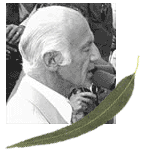 William McMahon (later Sir William), PC, CH (Liberal Party of Australia ) 10 March 1971 – 5 December 1972
William McMahon (later Sir William), PC, CH (Liberal Party of Australia ) 10 March 1971 – 5 December 1972
- Renowned for having “insatiable passion for work which seemed to lead nowhere. “
- Co-opted handsome young sailors in tight-fitting bell-bottom trousers to caddy for him at golf
- Governor General Paul Hasluck said of him: “I confess to a dislike of McMahon. The longer one is associated with him the deeper the contempt for him grows and I find it hard to allow him any merit. Disloyal, devious, dishonest, untrustworthy, petty, cowardly – all these adjectives have been weighed by me and I could not in truth modify or reduce any one of them in its application to him.”
- Always seemed to know statistics off by heart when asked in question time. It was later revealed that he just guessed the statistics while his staff waited to make the corrections in Hansard.
- Rumoured to be a closet homosexual.
Verdict: More concerned with the prestige of being PM than actually doing anything as PM. A useless PM.
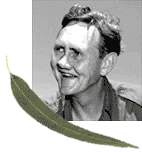 John Grey Gorton, PC (Liberal Party of Australia ) 10 January 1968 – 10 March 1971
John Grey Gorton, PC (Liberal Party of Australia ) 10 January 1968 – 10 March 1971
- As a pilot in the RAAF in Singapore, he was shot down by a Japanese fighter in January 1942
- While being evacuated in 1942, his ship was torpedoed
- Again in 1942, while flying a Kittyhawk out of Darwin in 1942, he crash landed and spent several days in the bush
- In 1943, he crashed his plane during take off and suffered serious facial injuries that left him scarred for life. Despite his crashes and mangled face, became a flight instructor
- After becoming PM, revealed he was born out of wedlock
- A noted womaniser
- A noted drunk. Inspired the euphemism “Gorton’s flu” in reference to a hangover
- Fostered an independent Australian film industry and increased government funding for the arts
- Distrusted the Americans in Vietnam
- At an international reception, jumped the fence at the official residence to go partying in the wee hours of the morning
- Concerns about his leadership led to a Party Room vote on 10 March 1971. Votes for and against him were equally divided but he used his own casting vote as chairman to vote himself out of office
- Said: “Labor is obsessed with the ‘tall poppies’, and seems determined to pull them down. But tall poppies, more and more tall poppies, are what this country needs. The chance to grow to a height is the chance for many to express themselves.”
- Is generally remembered as: “a knockabout bloke with the larrikin streak, his scarred features and crumpled suits, his candid approach and laconic air, jaunty grin, tousled hair and ever-present cigarette.”
Verdict: Never seriously gave a damn about what other people thought of him, and never really wanted the top job. Very much a man’s man. Due to his work with the film industry and the Arts, Gorton was one of the very few Liberal PMs to leave a legacy of cultural enrichment.
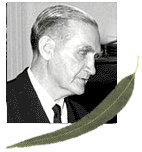 John McEwen (later Sir John), PC (Country Party) 19 December 1967 – 10 January 1968
John McEwen (later Sir John), PC (Country Party) 19 December 1967 – 10 January 1968
- Secured a renewed Australia-Japan trade agreement
- One of three Australian prime ministers to have been awarded Japan’s Order of the Rising Sun
- Buried his first wife on February 10, 1967, then on 26 July the next year he married his secretary, Mary Eileen Byrne – a girl 22 years his junior.
- Pursued what became known as “McEwenism” – a policy of high tariff protection for the manufacturing industry
- Disliked McMahon, who he believed was a homosexual.
Verdict: Helped the Australian economy integrate into Asia, while still protecting some Australian interests. An important cog in post World War II evolution.
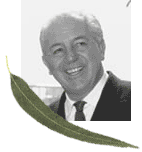 Harold Edward Holt, PC, CH (Liberal Party of Australia ) 26 January 1966 – 19 December 1967
Harold Edward Holt, PC, CH (Liberal Party of Australia ) 26 January 1966 – 19 December 1967
- Parents divorced when he was ten
- Mother died when Holt was 16. Holt did not attend her funeral
- His girlfriend, Zara Kate Dickens, left him for a British Army Officer in 1935. A decade later she returned and married him
- Father married one of his former girlfriends
- It was rumoured that he was the biological father of twin boys he claimed were his step-children. The ruse was to avoid admitting they were conceived during an extra-marital affair
- Told a Canadian audience that Australians were unique due to “our corals, our apples, our gum trees and our kangaroos.”
- Directed that the word “British” be dropped from Australian passports while the Nationality and Citizenship Act was changed to delete “British subject” in the text.
- Dramatically increased the Australian Army presence in Vietnam , including conscription into the army for young men;
- Said “All the way with LBJ” in reference to unwavering support for America
- Held a referendum to include Aborigines in the federal census and to give the federal government the power to make policies in respect to Aborigines
- Went for a swim and was never seen again. The event has been referred to as “the swim that needed no towel.” In Melbourne , construction soon began on the Harold Holt Memorial Swimming Pool.
Verdict: Not attending his own mother’s funeral and having a father that married one of his former girlfriends, suggests that his family life had been somewhat unusual. Did some good things to help Australia gain an identity unique from Britain. Although the removal of the word British was a step in the right direction, it was his famous swim that truly gave Australia an international reputation. World observers can’t imagine anything more Australian than a PM going for a swim and never being seen again, or anything more strange than then building a swimming pool to remember him by.
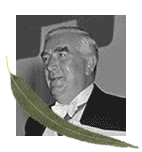 Robert Gordon Menzies (later Sir Robert), PC, KC (Liberal Party of Australia ) 26 April 1939 – 29 August 1941 , 19 December 1949 – 26 January 1966
Robert Gordon Menzies (later Sir Robert), PC, KC (Liberal Party of Australia ) 26 April 1939 – 29 August 1941 , 19 December 1949 – 26 January 1966
- Created the opportunity for the bright children of working class families to go to university
- In 1938, waterside unions put a ban on the export of iron to Japan in protest of Japanese actions in Manchuria (China). Menzies threatened them with Transport Workers’ Act 1929, and so forced them to load iron for Japan. Subsequently, he earnt the nickname “Pig Iron Bob”
- Was knighted in 1963
- Was awarded Japan’s Order of the Rising Sun in 1973
- Defined himself as “British to the Bootstraps”
- Started the PMs 11 cricket matches (the tradition continued until Paul Keating)
- Allowed England to detonate four atomic bombs in Western Australia
- Sent troops to help England suppress Independence movements in Malaysia
- Sent troops to Vietnam to support the American president’s quest to defend the free world
- Introduced conscription despite the fact he had declined to enlist for service in either World War 1 or 2
- Promised American president Lyndon B. Johnson that whatever happened in Vietnam , “whichever way it goes, my little country and your great country will be together through thick and thin.”
- In 1962, gave the Commonwealth vote to all Aborigines (Aborigines had been entitled to vote in federal elections under State laws dating back to the 1850s.) Campaign strategy was based on the Macarthian tactic of accusing Labor Party members of being communists
- Could be called the father of Higher Education. When he came to power, there were six universities and 14,236 higher education students in a population of seven million. By the time he retired in 1966 there were sixteen universities and 91,272 higher education students.
- Won all 12 federal elections in his parliamentary term
Verdict: As a nation builder, Menzies forced young Australians to fight in foreign wars, but refused to be in the trenches beside them. Despite some mistakes using 21st century morality, his ability to win 12 federal elections says something about whether he served the people well.
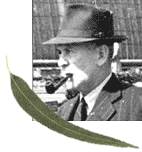 Joseph Benedict Chifley, PC (Australian Labor Party) 13 July 1945 – 19 December 1949
Joseph Benedict Chifley, PC (Australian Labor Party) 13 July 1945 – 19 December 1949
- Managed to have simultaneous affairs with three different women – his secretary, her sister and a typist from his own office
- Said: “We have a great objective – the light on the hill – which we aim to reach by working for the betterment of mankind … If it were not for that, the labour movement would not be worth fighting for.”
- Refused to wear ceremonial clothes and became a Privy Councillor in his own suit
- Implemented the Snowy Mountains Scheme, which at the time was considered one of the great engineering feats of the world
- Responsible for attracting a dramatic influx of of immigrants mainly from Southern Europe
- Established Trans Australia Airlines
- Nationalised QANTAS Anti-conscriptionist
- Said:” It’s no good crying over spilt milk; all we can do is bail up another cow.”
Verdict: Chifley’s ‘light on the hill’ is one of the few quotes by Australia’s PMs to have achieved immortality across the generations. As well being one of the few PMs able to inspire Australians with words, Chiefly was one of the few PMs able to unite Australians to get something done.
Chiefly’s Snowy Mountains Scheme gave employment for immigrants, improved the productivity of the Australian land, showcased Australia’s engineering talent to the world, continues to generate electricity, and has become a source of pride for many Australians.
Of course, the ability to inspire Australians with words, or convince them to accept plans for infrastructure, were insignificant achievements compared to having affairs with three women simultaneously – two of whom were sisters. Even Casanova would have struggled to pull off such a feat.
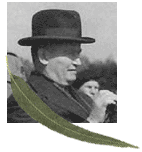 Francis Michael Forde, PC (Australian Labor Party) 6 July 1945 – 13 July 1945
Francis Michael Forde, PC (Australian Labor Party) 6 July 1945 – 13 July 1945
- Was the shortest-serving prime minister in Australian history
- Was said to have had “no eccentricities, no special charisma and no particular physical distinction therefore rarely attracted any attention from journalists or cartoonists”
- After retirement, devoted his life to Catholic charity work
- Was the longest lived Australian prime minister, living to the age of 92 years, six months and ten days.
Verdict: Perhaps being a politician was not Forde’s true calling in life.
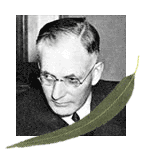 John Curtin, PC (Australian Labor Party) 7 October 1941 – 5 July 1945
John Curtin, PC (Australian Labor Party) 7 October 1941 – 5 July 1945
- Had a lazy eye
- The only Prime Minister to have been in gaol (anti-conscriptionist in 1916)
- Introduced conscription for overseas service for the first time in Australia ‘s history but limited it to service in the Pacific for the defence of Australia – not for the defence of Britain
- A recovering alcoholic
- Recalled Australian troops from the European theatre to defend Australia in the Pacific, much against the wishes of the British Prime Minister, Winston Churchill, who argued that Australia was expendable and the priority of the entire British Empire should be to defend Britain
Verdict: A wartime leader who managed to keep his country unified as he took the important symbolic steps towards Australia developing an identity distinct from Britain. It is largely due to Curtin that Australia’s defence alliances now lie with America rather than with England.
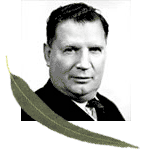 Arthur William Fadden (later Sir Arthur) (Country Party) 29 August 1941 – 7 October 1
Arthur William Fadden (later Sir Arthur) (Country Party) 29 August 1941 – 7 October 1
- Presented a roughneck image and always claimed that a politician would win more votes by telling a few good stories than by delivering a speech full of statistics
- Liked a beer and a dirty joke
- Extreme anti-communist
- Titled his memoirs They Called Me Artie
Verdict: Managed to keep his private views to himself, and did a good job in presenting a positive face to the people.
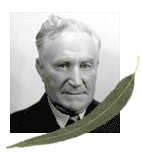
| Sir Earle Christmas Grafton Page, PC, GCMG (Australian Country Party) 7 April 1939 – 26 April 1939 |
- Disliked Robert Menzies, Lyons ‘s deputy, on the grounds that Menzies had been disloyal to Lyons. When Menzies was elected UAP leader, Page refused to serve under him, and made an extraordinary personal attack on him in the House. The Party then expelled him
- Refused to retire and even when 81 years old and dying from lung cancer, still contested the 1961 election
- It was said that his impatience and quick mind led him to speak in a torrent of high-pitched words with ideas often outstripping expression.
Verdict: A man of convictions, and one who would never surrender to them. Although such inflexibility ultimately damaged his career, it did make him a worthy of respect. Most politicians just sell out their morality when they have something personal to gain.
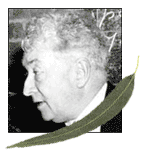 Joseph Aloysius Lyons, PC, CH (United Australia Party) 6 January 1932 – 7 April 1939
Joseph Aloysius Lyons, PC, CH (United Australia Party) 6 January 1932 – 7 April 1939
- Walked with a marked limp, the legacy of a car accident.
- Caricatured as a koala
- Anti-conscription activist during World War I
- Genial extrovert who believed in making friends with everyone, including members of the Opposition
- After winning a crucial High Court case against the NSW Government, was told of Phar Lap’s death. Subsequently told Australia : “what’s the use of winning a High Court decision and losing Phar Lap?”
- At the age of 35, as Minister for Education he married Enid Muriel Burnell, a 17-year-old trainee teacher.
- Arguably Australia ‘s most popular Prime Minister
Verdict: A likeable PM who benefited from the post-depression economic recovery. Overall, did a good job.
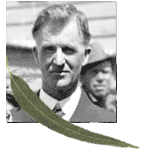
James Henry Scullin, PC (Australian Labor Party) 22 October 1929 – 6 January 1932
- Established the Australian Broadcasting Commission (ABC)
- Honed his debating skills at the Catholic Young Men’s Society
- First Prime Minister to appoint an Australian governor-general.
Verdict: Led Australia in a very difficult time and implemented some policies that helped Australia cope with the depression. Also undertook the important symbolic steps towards Australia finding an identity distinct from Britain .
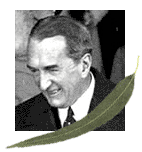 Stanley Melbourne Bruce, PC, CH, MC (Nationalist Party) 9 February 1923 – 22 October 1929
Stanley Melbourne Bruce, PC, CH, MC (Nationalist Party) 9 February 1923 – 22 October 1929
- At his private grammar school, was captain of the football, cricket, boating and athletics teams
- When the First World War broke out, he was commissioned as an officer in the British Army and fought at Gallipoli and the Western Front.
- In 1917, he was decorated with the Military Cross and Croix de Guerre
- Anti-unionist who he described as “Wreckers who would plunge us into the chaos and misery of class war”
- Established the CSIRO
- Presided over the actual physical transfer of the seat of Government to the new Capital of Canberra
- When he died in London in 1967, his will provided for his ashes to be brought home and sprinkled over Lake Burley Griffin in Canberra
- As prime minister, he is remembered best for being the first incumbent of that office to lose his seat in a general election.
Verdict: A leader who put plans into action, and with the establishment of the CSIRO, ensured new plans would be created for many generations to come. Took on the unions, and lost.
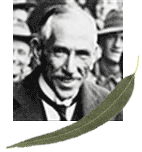 William Morris Hughes (Australian Labor Party; Nationalist Party from 1917) 27 October 1915 – 9 February 1923
William Morris Hughes (Australian Labor Party; Nationalist Party from 1917) 27 October 1915 – 9 February 1923
- A famous plotter and schemer
- Said it was ” Australia ‘s destiny to lead and enlighten the rest of the world”, to cast off the “shackles and burdens which had bound and oppressed” the people
- A strong advocate of conscription.
Verdict: An uncanny habit of establishing parties only to be expelled from them. A man of imagination and charisma, but one not always capable of using such talents to solidify support behind him. Presided over the resignations of hundreds of secretaries, and his own sacking from every party he entered.
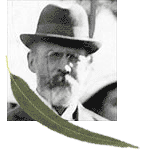 Joseph Cook (later Sir Joseph) (Liberal Party of Australia ) 24 June 1913 – 17 September 1914
Joseph Cook (later Sir Joseph) (Liberal Party of Australia ) 24 June 1913 – 17 September 1914
- Opposed drinking, smoking, gambling and other frivolous pastimes
- In election campaigns, stressed Australia ‘s unflinching loyalty to Britain
- Dubbed ‘the most humourless’ of the prime ministers
- Never wrote any memoirs
Verdict: Opposing gambling, alcohol and other frivolous pastimes was most un-Australian. Understandable that he didn’t write any memoirs; the man never lived. An unfortunate blight on Australia ‘s history.
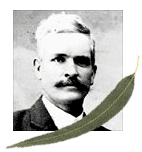 Andrew Fisher (Australian Labor Party) 13 November 1908 – 2 June 1909 , 29 April 1910 – 24 June 1913 17, September 1914 – 27 October
Andrew Fisher (Australian Labor Party) 13 November 1908 – 2 June 1909 , 29 April 1910 – 24 June 1913 17, September 1914 – 27 October
- Born in Scotland, Fisher started working in coal mines at the age of 10 and immigrated to Queensland at the age of 13
- Married his landlady’s daughter
- Established the old age pension
- Introduced a tax on unimproved land. The tax aimed to force large land owners and pastoral companies to break up the millions of hectares on which they were squatting and turn them over to small farmers
- Decided the site for the national capital, laid its foundation stone and gave the Aboriginal name of ‘Canberra.’
- In October 1914, Fisher signed Labor’s election manifesto which made the historic pledge ” .. we will stand by the Mother Country to help and defend her to the last man and the last shilling”
- In 1916, he opposed the conscription movement which would have put ‘the last man’ at Britain’s disposal.
Verdict: Although Fisher’s anti-conscriptionist stand wrecked his party, it ultimately defended the freedoms of the people he served.
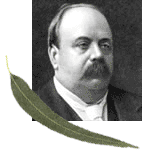 George Houstoun Reid (later Sir George), PC, KC (Free Trade) 18 August 1904- 5 July 1905
George Houstoun Reid (later Sir George), PC, KC (Free Trade) 18 August 1904- 5 July 1905
- Described “as immense, unwieldy, jelly-like stomach always threatening to break his waistband, his little legs apparently bowed beneath its weight, [and] his thick neck rising behind his ears rounding to his many-folded chin”
- Journalist Alfred Buchanan said of him: ” “He did not walk, he rolled…”
- Despite being ugly, was a noted womaniser
- Earned the nickname of ‘Yes-No’ because of his ambivalent attitude to federation
- Not trusted by his party
- Passed the Conciliation and Arbitration Act 1904, establishing a court for settling industrial disputes. This has become one of the most important pieces of legislation in Australian history.
Verdict: Despite being subjected to fat man taunts, didn’t stay at home eating buckets of ice cream or crying about not meeting the ideal of the beauty magazines. Instead, he got on with the job of leading Australia, which also seemed to endear him to woman who could look beyond his prosperous girth, and if not, at least jump on it.
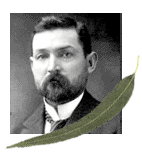 John Christian Watson (Australian Labor Party) 27 April 1904 – 17 August 1904
John Christian Watson (Australian Labor Party) 27 April 1904 – 17 August 1904
- Led the world’s first labour government (American spelling to associate it with progressive America rather than conservative England.)
- Co-founded the NRMA
- Born in Chile to Chilean-German father and New Zealand-Irish mother
- Once worked as a stable hand shovelling manure in Sydney
- Believed in solidarity, once saying: “If we don’t hang together we’ll hang separately’
- Hung separately after being expelled by the party for supporting conscription.
Verdict: A good bloke who worked with other parties to achieve the important aims of the labour movement. Watson’s support of conscription is his one major blemish.
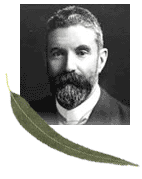 Alfred Deakin (Protectionist Party) 24 September 1903 – 27 April 1904 , 5 July 1905 – 13 November 1908 , 2 June 1909 – 29 April 1910
Alfred Deakin (Protectionist Party) 24 September 1903 – 27 April 1904 , 5 July 1905 – 13 November 1908 , 2 June 1909 – 29 April 1910
- Had a grand dream of Australians evolving as a splendid new race of British stock “without the admixture of other races”
- Said of Asians: “It is not the bad qualities, but the good qualities of these alien races that make them so dangerous to us. It is their inexhaustible energy, their power of applying themselves to new tasks, their endurance and low standard of living that make them such competitors.”
- Only PM to reject the title ‘Right Honourable’ Only PM to refuse honorary degrees from Oxford and Cambridge universities Only PM to reject membership of Privy Council
- A journalist said of him: “a most agreeable person to talk to…at his best when talking to little-known people and likely to make it his business to entertain you”
Verdict: Deakin was pro-British in his words, yet in his behaviour he seemed determined to free himself and Australia from British customs. Largely responsible for the White Australia Policy. Whether the policy aimed to preserve racial purity or to prevent the formation of an underclass via an influx of cheap labour, is a question for historians to debate.
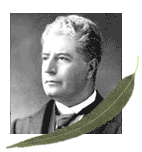 Edmund Barton (Protectionist Party) – 1 January 1901 – 24 September 1903
Edmund Barton (Protectionist Party) – 1 January 1901 – 24 September 1903
- Known as Toby Tosspot during his time in office due to fondness for booze
- Although fond of booze, not very adept at holding his liquor. Was said to be in the “habit of taking so much to drink that he becomes slow of comprehension and expression”.
- Made a speech that included the line: “These races are, in comparison with the white races- I think no one wants convincing of this fact – unequal and inferior”
- Worked with Deakin on the Immigration Restriction Act
- Said: “I do not think that the doctrine of the equality of man was really ever intended to include racial equality”
- One of three Australian Prime Ministers to receive Japan ‘s Order of the Rising Sun
Verdict: Australia ‘s first leader but one who did little to inspire sentiment that there was anything worthy about the Australian character. Perhaps this explains why most Australians can’t remember his name.
“Let no-one say the past is dead, the past is all about us and within”(Oodgeroo)








No Comments